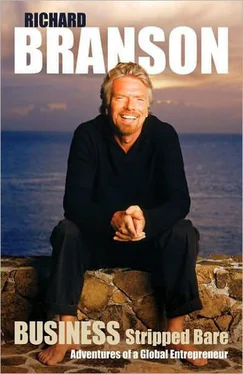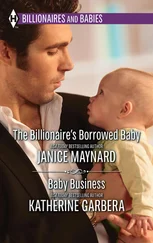And as the business gets bigger, you will have to decide if you’re a manager or an entrepreneur. If you’re a manager you can stay with that business and help it grow. If you’re an entrepreneur, you need to find a manager. Then you should move on, enjoy yourself and then set up your next enterprise.
Nothing in business is quite like the early, frenetic days of an ambitious start-up project. There’s always an amazing buzz about this kind of thing. It’s high-octane and high-risk and it builds a tremendous spirit and camaraderie which takes everyone through some very trying times. I’ve seldom seen people work harder than in the initial stages of a new venture. Once a business matures and is established, it can become more challenging to retain that excitement. What we do at Virgin is not let businesses get too mature. If you can keep the businesses relatively small, people will know each other within the organisation and feel like part of a team.
It’s then down to the leadership of that organisation to keep making sure that people are challenged and motivated. Jack Welch, a great business leader, who transformed GE into one of the world’s leading corporate powerhouses, was constantly evolving tools and methods in search of continuing growth. He encouraged managers to start each day as if it was the first day in the job. He said that managers were often afraid of change — and they must embrace it. I agree with Jack on that.
We never let people sit on their laurels, and we keep on trying to improve things. The minute Virgin Atlantic was voted ‘The airline with the best business-class seats in the world’ in the UK Airline awards, our designer was already beginning to work on the next seats in order to beat our own expectations rather than our competitors’. You must either stay ahead of other people, or stay ahead of yourself, all the time. If you really put your mind to it you are normally going to find a better way. You have to keep on questioning the way people do things.
Looking back over the personal notebooks I have kept for more than thirty-five years, I don’t think there has ever been a letter from my office which criticises the staff or an individual. Now and again I’ve disagreed with something and suggested changes in behaviour. But the Virgin Group has always tried to look for the best in people. That way, you get the best back.
A plant needs to be watered to flourish and people need encouragement so that they can flourish. If this sounds precious, so what? It’s true. When someone says something nice about any of our Virgin ventures, I feel great. I’m flattered. When someone has a go, it knocks me back. We’ve developed a thicker skin over the years, but I hope we haven’t lost the sensitivity to do things properly. If witless criticism can deflate me, after thirty-odd years of business success, then what a fool I’d be to go around ticking off other people. People say business is a cut-throat affair. Certainly it’s a tough game — we talk about ‘the competition’ for a reason. And, yes, sometimes people play dirty. But nothing in my years with Virgin has eroded my habit of saying thank you to people or praising them. I was brought up in England by parents who praised and encouraged me a lot. Why would I behave differently to others?
Right across our business we have a philosophy of encouragement. Our people are very rarely criticised. If someone makes a howling mistake, usually they don’t need to be told. They know.
One of my weaknesses is that I find it very hard to tell someone that their services are no longer required in the business. It’s an unpleasant obligation, and one you absolutely must not shirk. If you’re a small company, it is vital to do it personally. You really have to see the person face to face rather than get someone else to do it. I think, generally, a personal explanation of the situation is appreciated, and it helps the individual you’re letting go to move on.
Of course, if you actually enjoyed firing people, there’d be something wrong with you. Jack Welch made a point of continually weeding out the people at the bottom. Alan Sugar and Donald Trump aren’t afraid to fire people either, though I doubt they go about it quite the way The Apprentice would have us believe. There’s a machismo about the way some managers talk about hiring and firing that I find downright repugnant. A senior person at Apple rather proudly says in his speeches about firing people that ‘I’d rather have a hole than an asshole.’ My philosophy is very different. I think that you should only fire somebody as an act of last resort.
If someone has broken a serious rule and damaged the brand, part company. Otherwise, stop and think. Indeed, these days you have to. There are a lot of legal and employment issues to take into consideration before you even go down that route. This can be frustrating, but to be honest I don’t think it’s the nightmare that some managers make it out to be. People respond to their surroundings. If someone is messing things up royally, offer them a role that might be more suitable, or a job in another area of the business. You’d be amazed how quickly people change for the better, given the right circumstances, and how willing they are to learn from costly mistakes when offered a second chance. If you’ve over-promoted someone and it hasn’t worked out — which happens — then offer them their old job back rather than firing them. It’s your fault for over-promoting them. Not theirs.
A lot of companies these days call themselves ‘families’. Usually, this is just an embarrassing bit of public relations flannel. I think companies can be like families, that it’s a good approach to business, and that Virgin’s created better corporate families than most. We’ve done it by accepting the fact that we have to think beyond the bottom line. Families forgive each other. Families work around problems. Families require effort, and patience. You have to be prepared to take the rough with the smooth. You have to put up with your troublesome siblings. They’re your family: you can’t just throw them out on the street.
The higher up you go in a company, the more perilous your job position is if you don’t perform. In football, dropping out of the Premiership — or failing to get into the Champions League — can be disastrous. The board of directors, or the club chairman, must hit upon a formula for success, and the buck has to stop with the coach. Sacking the coach is easy. The hard part is making sure you’re getting someone better than the person you’re dropping. In football, that doesn’t always seem to be the case.
I often read about chief executives, managing directors and large company bosses who are told to resign from their high-profile companies by investors because they have made a hash due to poor business decisions. In the United States, for example, we’ve had Angelo Mozilo, the CEO of Countrywide Financial, Citigroup’s boss Chuck Prince and Merrill Lynch’s Stan O’Neal all departing with $100-million-plus compensation packages despite their businesses being caught in the sub-prime mortgage meltdown.
Too many top executives are given massive payouts and allowed to walk away, leaving others to sort things out. I think the opposite should happen. In most cases, leaders should stay on until any problems are sorted out — or a solution found — and then they can go and with a fraction of the money they would earn if successful.
Decent leadership is about explaining clearly and unemotionally why a decision has been taken. This applies just as much to a large company when there are lots of jobs at stake. For a business to survive under extreme pressure it must take decisive action. And when there are a lot of redundancies, that can hurt the pride and self-esteem of a lot of hard-working individuals.
Читать дальше












